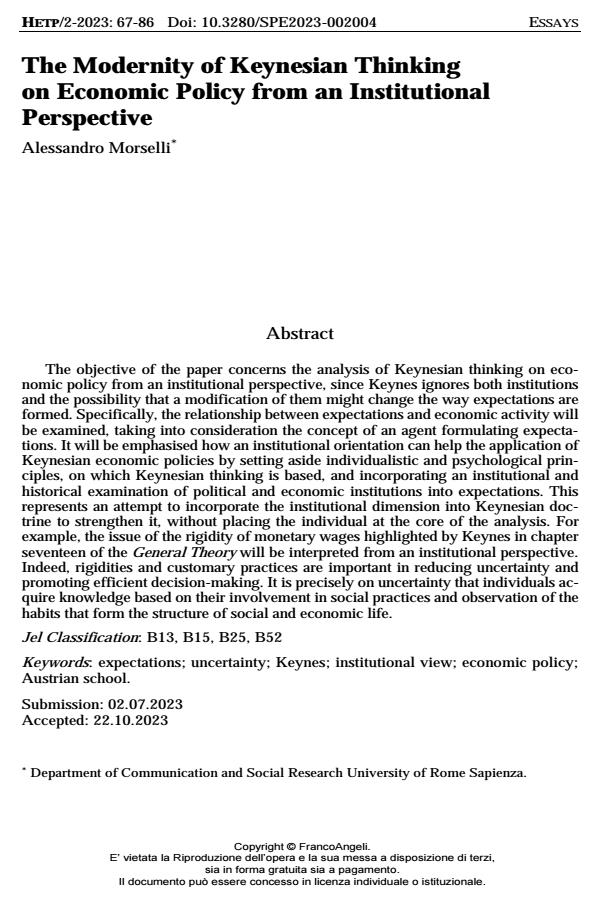The Modernity of Keynesian Thinking on Economic Policy from an Institutional Perspective
Titolo Rivista HISTORY OF ECONOMIC THOUGHT AND POLICY
Autori/Curatori Alessandro Morselli
Anno di pubblicazione 2024 Fascicolo 2023/2
Lingua Inglese Numero pagine 20 P. 67-86 Dimensione file 81 KB
DOI 10.3280/SPE2023-002004
Il DOI è il codice a barre della proprietà intellettuale: per saperne di più
clicca qui
Qui sotto puoi vedere in anteprima la prima pagina di questo articolo.
Se questo articolo ti interessa, lo puoi acquistare (e scaricare in formato pdf) seguendo le facili indicazioni per acquistare il download credit. Acquista Download Credits per scaricare questo Articolo in formato PDF

FrancoAngeli è membro della Publishers International Linking Association, Inc (PILA), associazione indipendente e non profit per facilitare (attraverso i servizi tecnologici implementati da CrossRef.org) l’accesso degli studiosi ai contenuti digitali nelle pubblicazioni professionali e scientifiche.
The objective of the paper concerns the analysis of Keynesian thinking on economic policy from an institutional perspective, since Keynes ignores both institutions and the possibility that a modification of them might change the way expectations are formed. Specifically, the relationship between expectations and economic activity will be examined, taking into consideration the concept of an agent formulating expectations. It will be emphasised how an institutional orientation can help the application of Keynesian economic policies by setting aside individualistic and psychological principles, on which Keynesian thinking is based, and incorporating an institutional and historical examination of political and economic institutions into expectations. This represents an attempt to incorporate the institutional dimension into Keynesian doctrine to strengthen it, without placing the individual at the core of the analysis. For example, the issue of the rigidity of monetary wages highlighted by Keynes in chapter seventeen of the General Theory will be interpreted from an institutional perspective. Indeed, rigidities and customary practices are important in reducing uncertainty and promoting efficient decision-making. It is precisely on uncertainty that individuals acquire knowledge based on their involvement in social practices and observation of the habits that form the structure of social and economic life.
Parole chiave:expectations; uncertainty; Keynes; institutional view; economic policy; Austrian school.
Jel codes:B13, B15, B25, B52
Alessandro Morselli, The Modernity of Keynesian Thinking on Economic Policy from an Institutional Perspective in "HISTORY OF ECONOMIC THOUGHT AND POLICY" 2/2023, pp 67-86, DOI: 10.3280/SPE2023-002004